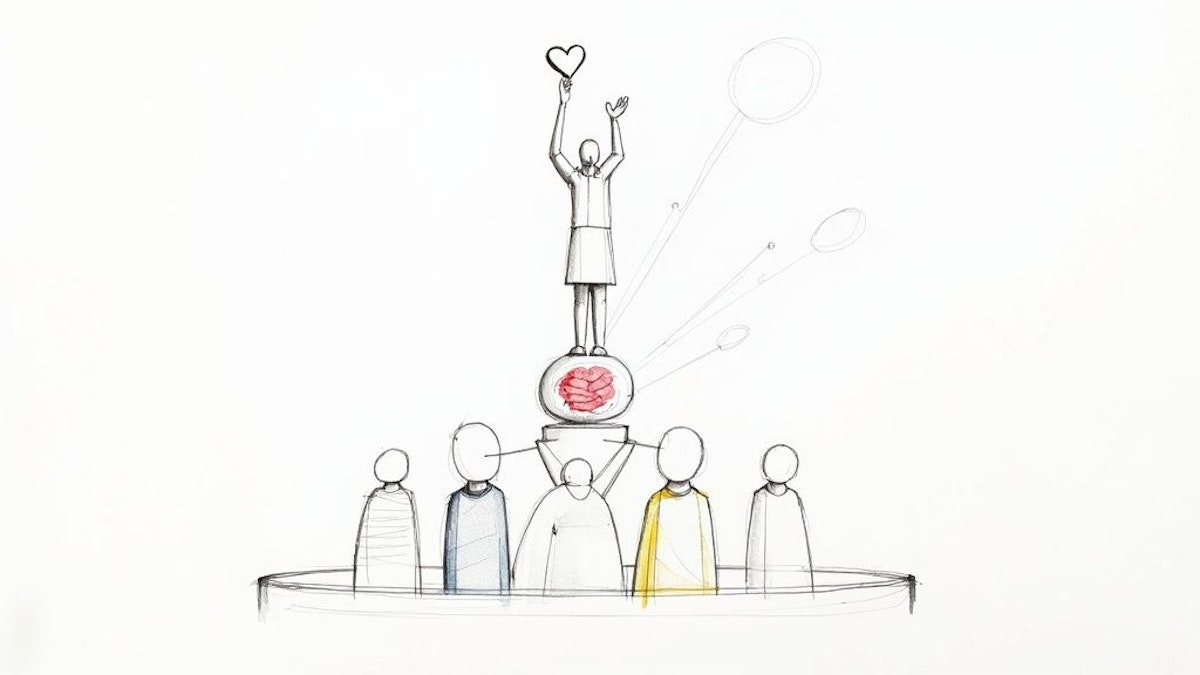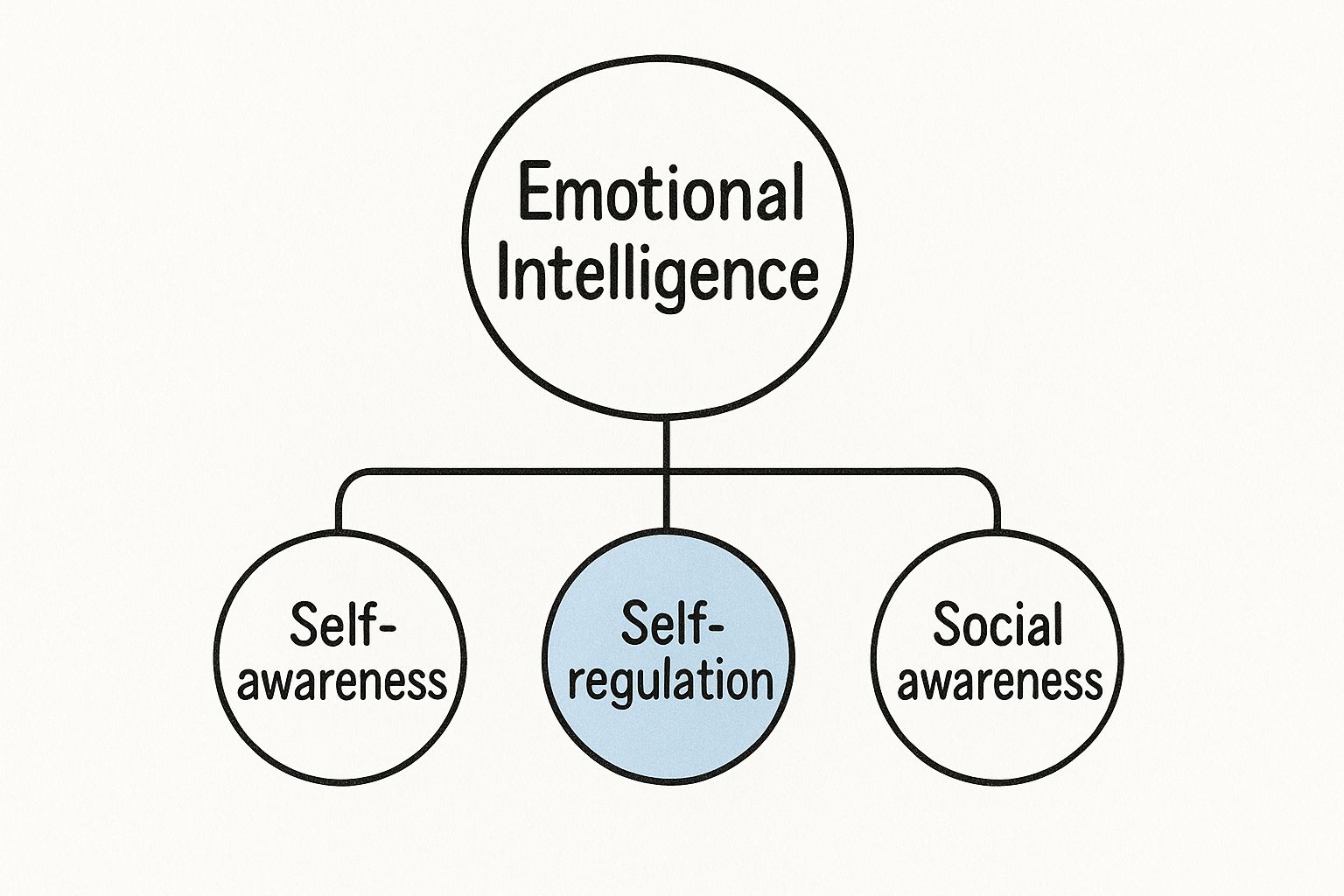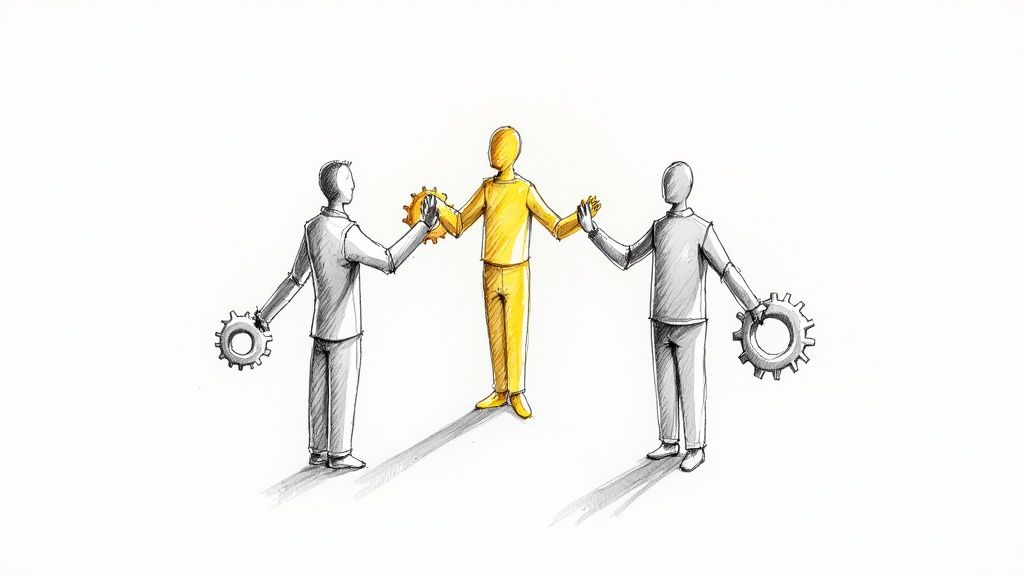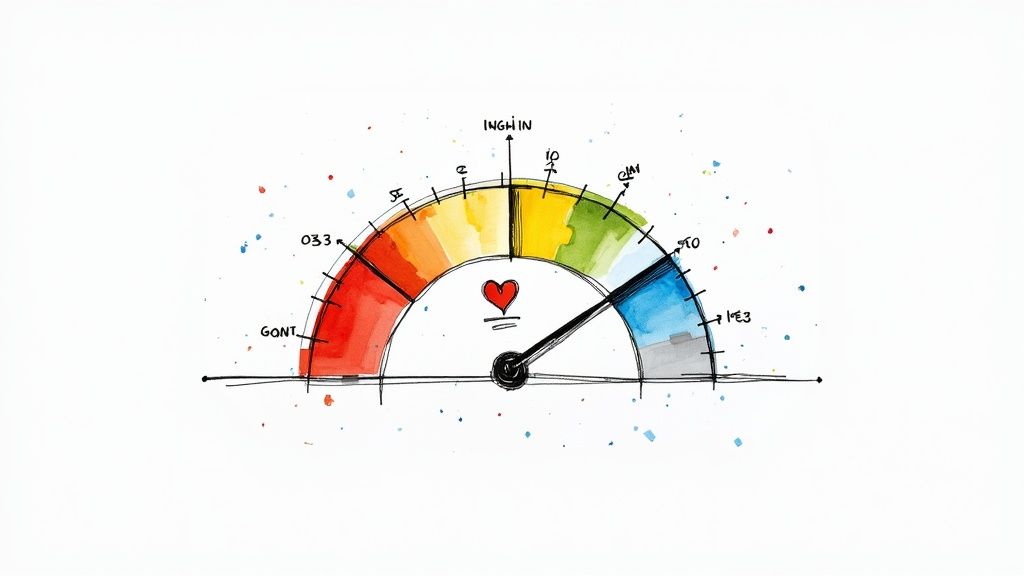What Is Emotional Intelligence in Leadership? Boost Your Skills

Emotional intelligence in leadership isn't just about being "nice." It's the very real, very practical ability to recognize your own emotions and then use that understanding to read and influence the emotions of the people around you. Think of it as a strategic skill that helps you build stronger relationships, navigate tricky social situations, and ultimately, make better decisions. It's a massive driver of success, for both you and your team.
Defining Emotional Intelligence in Modern Leadership

Picture a great orchestra conductor. They aren't just reading notes on a page. They feel the music, sense the energy of every musician, and guide each section to create something powerful and cohesive. That's a perfect picture of emotional intelligence in action. It’s what separates a manager who just gives orders from a leader who inspires everyone to play their best.
An emotionally intelligent leader gets that work is a human endeavor. They see emotions not as a distraction but as valuable data that offers real insight into team morale, motivation, and potential roadblocks. Instead of ignoring feelings, they use this awareness to build a culture of collaboration, resolve conflicts, and create a psychologically safe space where people feel they can truly thrive.
Why It Matters More Than Ever
Let's be honest: technical skills and raw intellect will only get you so far. The thing that truly separates exceptional leaders from the rest is their ability to connect with, motivate, and guide people. In today's workplace, this isn't a soft skill; it's a direct driver of hard results.
The data backs this up in a big way. Research by TalentSmart found that a staggering 90% of top performers have high emotional intelligence. What's more, the same study concluded that EI is responsible for nearly 58% of job performance across all types of industries. If you're interested in the numbers, you can read the full research on emotional intelligence statistics to see the data for yourself.
The Four Pillars of EI
To really get a handle on emotional intelligence, it helps to break it down into its core parts. These four pillars work together, each one building on the last, to create a complete and powerful leadership skill set.
Emotional intelligence is the cornerstone of effective leadership. It moves beyond traditional management by focusing on the awareness and regulation of emotions—both in oneself and in others—to create environments of trust, resilience, and high performance.
To start, let's get a clear view of these foundational pillars. This table gives a quick overview of what each one means in the real world of leadership.
The Four Pillars of Emotionally Intelligent Leadership at a Glance
| Pillar | What It Means for a Leader | Key Action |
|---|---|---|
| Self-Awareness | Understanding your own emotions, strengths, and weaknesses, and how they impact your team. | Recognizing how your mood affects your decision-making. |
| Self-Management | Controlling your emotional reactions and staying calm and clear-headed under pressure. | Pausing before reacting to unexpected bad news. |
| Social Awareness | Accurately perceiving and empathizing with the emotions and perspectives of others. | Noticing a team member's non-verbal cues of stress in a meeting. |
| Relationship Management | Using your awareness of emotions to build strong relationships, influence others, and manage conflict. | Giving constructive feedback that motivates, not discourages. |
As we explore each of these pillars in more detail, you'll see how they connect and why mastering them is so critical for modern leaders.
Exploring the Four Pillars of EI in Leaders
Emotional intelligence isn't some abstract, singular trait. It’s really a set of four distinct skills that work together. To get a real handle on what emotional intelligence in leadership looks like, we need to break it down into these four foundational pillars. Think of them as building blocks—each one supports the next, creating a solid framework for leading people effectively.
The diagram below shows how these core components all stem from emotional intelligence.

As you can see, it all starts with self-awareness. From that root, self-regulation and social awareness can grow, which together give you the ability to master relationship management.
Self-Awareness: The Foundation
Everything truly begins with self-awareness. This is your ability to tune into your own emotions, understand what triggers them, and have an honest grasp of your personal strengths and weaknesses. Without this internal compass, trying to manage yourself or connect with others is like trying to navigate without a map.
For instance, a self-aware leader knows they have a soft spot for candidates who went to their alma mater. By recognizing that bias before starting the hiring process, they can consciously put it aside and judge every applicant fairly, based purely on merit. It's a bigger blind spot than most people think; research by organizational psychologist Tasha Eurich revealed that while 95% of people believe they are self-aware, only 10-15% actually are. That's a huge gap leaders need to close.
Self-Management: The Ability to Respond Thoughtfully
Once you have that self-awareness, the next logical step is self-management. This is all about what you do with that awareness—specifically, controlling your emotional reactions, especially when the pressure is on. It’s the critical difference between a knee-jerk reaction and a considered response.
Imagine a project manager learning that a major deadline is suddenly in jeopardy. The impulse might be to lash out and assign blame. A leader skilled in self-management, however, takes a breath, stays calm, and calls a meeting to find a solution. That composure is contagious; it kills panic and creates an environment where people feel safe to solve problems.
An emotionally intelligent leader models stability. By managing their own impulses, they create a predictable and safe environment where their team can perform without fear of emotional volatility.
Social Awareness: The Empathy to See Others
After you get a handle on your own internal world, you can start looking outward. Social awareness is about picking up on the emotional currents in a room and genuinely understanding where other people are coming from. This is empathy in its most practical form.
Think about a manager leading a tense team meeting. They notice that while one person is talking, another team member has gone quiet, avoiding eye contact and fidgeting. A socially aware leader reads those non-verbal cues for what they are—disagreement, maybe, or discomfort. They can then gently bring that person into the conversation, making sure every voice is heard and respected. If you want to dive deeper into this idea, we explore it in our article on the theories of emotional intelligence.
Relationship Management: The Skill to Inspire Action
The final pillar, relationship management, is where everything comes together. This is the art of using your awareness of yourself and others to build strong connections, guide conversations, and inspire your team to act. It's where communication, conflict resolution, and mentorship all intersect.
You can see this skill shine when a leader has to give difficult feedback. Instead of delivering a blunt critique that just makes someone defensive, they approach the conversation with empathy. They focus on specific actions and work with the employee to find a path forward. This doesn't just fix a problem; it builds trust and motivates the person to grow, making the relationship stronger, not weaker.
The Business Case for Emotionally Intelligent Leadership

It’s one thing to know what emotional intelligence is, but it’s another to see how it directly impacts the bottom line. Let's be clear: this isn't some "nice-to-have" personality trait. Emotionally intelligent leadership is a hard business asset.
When leaders get a handle on their own emotions and tune into their team's, they create an environment where people can actually do their best work. It all starts with building psychological safety—a space where people aren't afraid to float a new idea, admit they messed up, or take a smart risk. A leader who can regulate their own reactions stops a culture of fear before it even starts.
And when you get that right, your teams become more engaged, resilient, and flat-out productive. That's a real competitive advantage.
Boosting Engagement and Reducing Turnover
One of the first places you’ll see the impact of emotionally intelligent leadership is in your retention numbers. It’s simple, really. Leaders with high EQ are just better at understanding what their people need, offering real support, and building relationships based on mutual trust.
That kind of culture makes people want to stick around.
Think about the staggering costs of high turnover—recruitment fees, lost productivity, and the hit to team morale. By creating a positive emotional climate, leaders can dramatically cut down on the number of people walking out the door. This doesn't just save a ton of money; it's essential for https://www.myculture.ai/blog/building-high-performing-teams.
A leader's emotional intelligence is a direct investment in the organization's human capital. It cultivates an environment where loyalty and engagement aren't just expected—they're a natural outcome of how people are treated every day.
This approach creates a powerful ripple effect, influencing not just one team but the entire company's culture and its ability to succeed long-term.
Driving Performance and Successful Change
The financial return on developing emotional intelligence is huge, and the data backs it up. When leaders go through dedicated EQ training, the results are striking.
For starters, leaders themselves see massive personal benefits. According to research from the Hay Group, those who foster an emotionally intelligent climate report a 96% increase in their own engagement and a 51% reduction in burnout. That’s a game-changer for sustainability in a high-pressure role.
But those individual gains quickly translate into company-wide wins. The same research shows organizations seeing a 56% boost in overall performance. A study by McKinsey & Company adds that when a company goes through a major change, it's 2.6 times more likely to succeed if leaders guide the process with an emotionally intelligent, human-centered approach.
So, what is emotional intelligence in leadership when you boil it all down? It's the ability to create the conditions for success. It means making better decisions under pressure, inspiring genuine loyalty, and navigating tough challenges with composure. This isn’t about soft skills; it’s about smart business.
How Emotional Intelligence Drives Success at Every Level
Emotional intelligence isn't some high-level skill reserved for the corner office. It's a universal asset, the secret sauce for effective leadership at every single rung of the corporate ladder. While it might look a little different in practice from role to role, its positive impact on performance, morale, and the bottom line is remarkably consistent.
Think about a frontline supervisor. For them, EI is all about managing the daily pulse of a team. It's having the empathy to step in and turn a simmering conflict over a shared project into a moment of collaboration. It’s about being able to read the room and know if the team needs a pep talk to get through a slump or a firm push to hit a deadline.
Move up a level to mid-level managers, and you'll see them using emotional intelligence to navigate trickier organizational currents. They rely on sharp social awareness to understand the unspoken priorities of different departments, allowing them to build bridges where others might build silos. This skill is absolutely critical when they're mentoring up-and-coming talent, helping them deliver feedback that actually inspires growth instead of just putting people on the defensive.
The Tangible Impact on Performance
The link between emotional intelligence and success isn't just a feel-good theory; it's backed by some seriously compelling numbers. When leaders are emotionally intelligent, the financial and operational gains are hard to ignore.
A study cited by Korn Ferry found that executives with high emotional intelligence generate 127% more revenue than their less-attuned peers. It doesn't stop there—the same source notes that 50% of the teams they lead exceed their profit targets. This effect trickles down, with mid-level managers using their EI to boost employee engagement by over 20%. And as research from Gallup has repeatedly shown, engaged teams go on to outperform others by a staggering 50% in productivity.
An emotionally intelligent leader doesn't just manage tasks; they cultivate an environment. This environment, built on trust and psychological safety, becomes the fertile ground where high performance naturally grows.
Senior Leadership and Strategic Vision
At the very top, for senior executives, emotional intelligence becomes a powerful strategic tool. A leader's self-awareness is what inspires deep trust, not just inside the company but with investors, board members, and key stakeholders. When you’re steering the ship through choppy waters or a major change, the ability to manage your own stress and project a sense of calm confidence is everything.
That kind of self-regulation is what stops leaders from making knee-jerk, short-sighted decisions and instead builds a culture of resilience. It's what allows a CEO to make a tough call but still communicate it with empathy, preserving morale and securing long-term loyalty. In our modern, often-distributed work world, this has become a non-negotiable skill for anyone focused on mastering the art of managing remote teams.
Cultivating that deep-seated loyalty is the bedrock of any great team. If you’re looking for ways to shore up your team’s foundation, our guide on how to build trust in teams is a great place to start.
From the front lines to the boardroom, emotional intelligence is the common thread that ties truly effective leadership together. It’s not just a soft skill; it’s a direct driver of tangible success.
Actionable Strategies to Develop Your Leadership EI

Emotional intelligence isn't some fixed trait you're either born with or you're not. Think of it more like a muscle. With the right exercises and consistent effort, it's a skill set anyone can strengthen over time.
Improving your EI is a journey of practice and reflection. By focusing on a few proven techniques, you can move beyond just knowing what emotional intelligence is and start living it. These strategies build on one another, starting from the inside out—from understanding yourself to improving how you interact with your team. The real magic happens with consistency, turning these conscious actions into your natural leadership style.
Strengthen Self-Awareness Through Reflection
You can't lead others if you can't lead yourself. And you can't lead yourself if you don't know yourself. This is where self-awareness comes in—it's the bedrock of emotional intelligence. Without a clear handle on what you're feeling and why, trying to manage your reactions or understand others is just guesswork.
A surprisingly powerful tool for this is simple, old-fashioned journaling.
At the end of each day, grab a notebook and spend just a few minutes answering these questions:
- What situation today really got a strong emotional reaction out of me? (Good or bad!)
- How did I actually act because of that feeling?
- If I could hit rewind, would I do anything differently? Why?
This isn't about beating yourself up. It's about becoming a detective of your own behavior, spotting the patterns in your emotional triggers so you can start making real, intentional changes.
It's a humbling thought, but research from organizational psychologist Tasha Eurich found a massive "self-awareness gap." While 95% of people believe they're self-aware, the data from her studies shows only 10-15% truly are. This makes a strong case for taking the time to reflect honestly.
Improve Self-Management with Mindfulness
Once you start recognizing your emotions as they bubble up, the next step is learning to manage them, especially when the pressure is on. This is self-management: the ability to hit the pause button instead of letting your emotions run the show. Mindfulness is your best friend here.
You don't need a yoga mat or a silent retreat. Just start with a one-minute reset.
The next time you feel that wave of stress, anger, or frustration rising, just stop. Pause for 60 seconds. If you can, close your eyes and focus on nothing but the feeling of your breath going in and out. This tiny break is often enough to stop an emotional hijack in its tracks, giving your logical brain a chance to get back in the driver's seat.
Enhance Social Awareness with Active Listening
To genuinely connect with and understand your team, you have to learn to listen. I mean really listen. Social awareness, and empathy in particular, is built on a foundation of active listening. This is the difference between hearing words and understanding the person behind them.
When a team member is talking to you, put your phone down. Turn away from your monitor. Give them your full, undivided attention. Listen not just to what they're saying, but how they're saying it—notice their tone and body language.
Before you jump in with your own opinion, try summarizing what you just heard. A simple, "Okay, so if I'm getting this right, you're concerned about..." does two amazing things. First, it ensures you're both on the same page. Second, it proves you're actually listening, which builds incredible trust. That kind of trust is fundamental when you're thinking about how to reduce staff turnover.
Unpacking Common Questions About Emotional Intelligence
As you get more familiar with the idea of emotional intelligence, a few common questions and myths inevitably pop up. It's one thing to understand the concept, but it's another to see how it plays out in the real world. Let's tackle some of the most frequent questions to clear up any confusion.
One of the biggest hang-ups is the idea that emotional intelligence just means being "nice." That's not it at all. EI is about being effective. It’s the difference between sugarcoating a problem and delivering tough feedback in a way that someone can actually hear and act on. It’s about having the self-control to make an unpopular but necessary decision with empathy and a steady hand.
Another popular question is whether you're just born with it or not. Is emotional intelligence a fixed personality trait?
The good news is that emotional intelligence is absolutely not fixed. While some of us might have a head start in certain areas, the research is clear: EI is a set of skills. And like any skill, you can build it with focused effort and consistent practice. Think of it like a muscle that gets stronger with every workout.
This means anyone, at any level, can deliberately improve their ability to understand and work with emotions.
Is Emotional Intelligence a Sign of Weakness in Leadership?
This one comes up a lot, especially in tough, results-driven industries. There's a lingering fear that paying attention to emotions is "soft" and signals weak leadership. This completely misses the point—and the strategic advantage EI gives you. A leader with high EI isn't ruled by their feelings; they use emotional data to make sharper, more strategic decisions.
Think about it this way:
- Conflict Resolution: A leader who just sees the surface-level argument will struggle. One who understands the emotional currents underneath the conflict can navigate it skillfully and find a real resolution.
- Negotiation: Being able to read the room and sense the other party's emotional state is a massive advantage. It tells you when to push, when to pull back, and how to frame your offer.
- Team Motivation: If you think a paycheck is the only thing that drives your team, you're leaving a ton of potential on the table. Understanding what truly lights someone up is the key to unlocking their best performance.
Ignoring emotions in business is like trying to sail a ship while ignoring the wind and tides. Emotionally intelligent leadership is about being aware, adaptable, and resilient—the very definition of strength.
Can You Have Too Much Emotional Intelligence?
It’s a fair question. Is it possible to overdo it? In some rare cases, an over-reliance on one aspect of EI, without balancing it against other critical skills, can create problems. For example, a leader with extremely high empathy might agonize over a tough decision because they feel everyone's potential disappointment so acutely, leading to paralysis.
The goal is always balance. The best leaders don’t just have high EI. They blend it with sharp strategic thinking, solid judgment, and an unwavering focus on the mission. Emotional intelligence is one of the most powerful tools in your leadership toolkit, but it works best when you know how to use it alongside all the others.
Ready to build a stronger, more cohesive team by hiring for culture fit? MyCulture.ai provides the tools to assess candidates' values and behaviors, ensuring your next hire is a perfect match. Learn more and start building your high-performing team today.